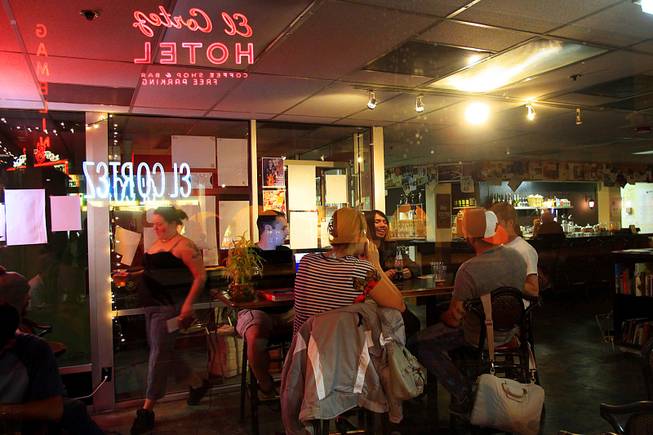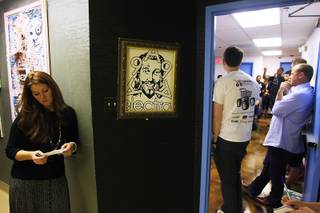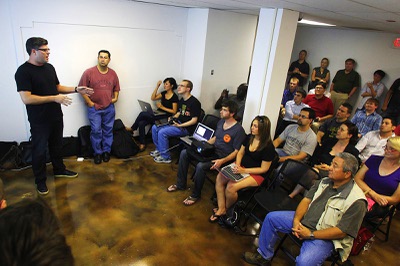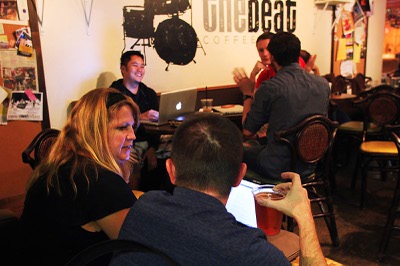
From left, Jason Arhart, Lacy Soares, Gabriel Evans, Hammed Kohistani and Brenden Soares talk around a table during a meeting of Las Vegas Jelly, Sept. 29, 2011.
Thursday, Oct. 6, 2011 | 2 a.m.
Sun Topics
The reality of working from home sank in for John Hawkins the first Monday after football.
He had just quit his job in corporate America after 11 years, the last of which he describes as nearly unbearable, in order to pursue full-time self-employment through his web design and site development company, 9seeds.
It was an exciting time. No boss but himself — and maybe his wife. If he wanted, he didn’t even have to wear pants while he worked.
Still, the first Monday was lonely.
“I’m not even a football fan, but I was in a fantasy league (with some co-workers),” Hawkins says. “It forced me to pay attention to the games a little more. It was fun.”
Hawkins found out firsthand that a person’s workplace offers far more than desks, file cabinets and swivel chairs. Work is often people’s primary social outlet.
Gone for Hawkins were the hallway conversations about last night’s big game, people’s weekend plans or the weather. He admits he didn’t realize he would miss those mundane conversations.
“You miss the water-cooler talk right away,” he says. “It doesn’t take long. Sure, there is gChat, Twitter and Skype, but it isn’t the same.”
To curb his cabin fever, Hawkins did what many freelancers and telecommuters do. He worked out of various coffee shops.
It works, but it is far from perfect.
Coffee shop offices
You might call casual co-working spaces the next evolution of the makeshift coffee shop office. The idea is simple: Individuals who work alone or in small companies pool resources to share technical office accouterments, such as printers and fax machines, and offer social and mental stimulation, which can range from simple small talk to informal brainstorming and mentoring sessions with feedback on projects or ideas.
Such setups have been more common in cities like San Francisco and Los Angeles than Las Vegas — until now. Fueled by the growing tech industry, several casual co-working spaces are in development in the city.
Pawel Szymczykowski’s /usr/lib/ (pronounced “user lib,” short for “user library”) is one of them. Located on the second floor of Emergency Arts downtown, /usr/lib/ is a multi-use space designed to provide people with resources, a place to work and space to hold meetings or special events. It is scheduled to open sometime this month, but has already been the site of events during the construction and design phase.
“You could say it’s a more social library, one with less shushing,” Szymczykowski says.
For the library component, Szymczykowski has acquired nearly 1,000 books. Some are technical resource manuals, others are business focused and still more are general interest publications meant to amuse or inspire. They will be housed on bookshelves purchased from the closed Borders bookstores, which Szymczykowski finds oddly fitting.
“I used to work in Borders all the time,” he says. “I think it is cool that we can give them new life.”
With the casual co-working space, plenty of outlets for laptop chargers are available, along with whiteboards along the walls for working out problems or brainstorming. Finally, secured meeting rooms will be available for those needing a private setting.
To many clients of the small-business owners using a casual co-working space like /usr/lib/, meeting in an office setting downtown may appear more professional than traveling to someone’s house in the suburbs. It may also feel safer or be more convenient because of the central location.
That isn’t the real draw, though.
For Hawkins, and many others who favor a casual co-working environment, the biggest personal benefit is being around other industry people, even if they aren’t directly working with them.
“Just sitting somewhere and hearing other people talk tech puts me in a different state of mind,” he said.
Hawkins frequents Vegas Jelly, a casual co-working group that meets every other Thursday at The Beat, a coffee shop located on the ground level of Emergency Arts. He says he has built several great business contacts from the group, but, if nothing else, it got him out of the house.
“I helped a designer who needed some help with his website,” Hawkins says. “In my business, I might charge $100 an hour, but at Jelly, it’s just, like, ‘Pull up a chair. I’ll help. Buy me a beer.’ He offered himself as a designer to me. I don’t need a designer at the moment, but someday I might.”
That pay-it-forward mentality forms the foundation of Jelly and other casual co-working groups. Alex Hillman, one of the founders of a successful, casual co-working membership-driven space called Indy Hall in Philadelphia, says it isn’t about offering people better desks, but better co-workers.
He noted that when Indy Hall first opened, the membership consisted almost exclusively of people from the tech industry but has since grown to include lawyers, artists, graphic designers and writers.
“You learn more from people not like you than people like you,” Hillman says.
One hurdle people must get over quickly when attending casual co-working spaces or events is the concept that everyone is out to steal your idea.
“I get the question about idea theft all the time,” Hillman says. “I have to tell people, ‘Why would someone with their own good ideas steal yours?’ ”
Hillman says listening to others pitch or develop their ideas a time or two usually humbles people and makes them realize their ideas were never as unique as originally believed.
Dylan Bathurst agrees. He runs Vegas Jelly, which holds breakout sessions in which people can pitch ideas and get feedback. “People have asked me, ‘Aren’t you afraid someone will steal your idea?’ I say bring it on. I’m not. When you are passionate about your idea, you will work at it and be the best.”
Jelly spreading
Bathurst held the first Vegas Jelly in late April with a group of 10 personal friends. Since then the group has held 12 meetings and grown to more than 100 attendees. Its mission has expanded beyond networking and work sessions to include guest speakers and workshops.
“In other cities, Jelly is just people getting together and working. Here, it’s been more of a networking opportunity because that’s what we need,” Bathurst said.
Hillman believes it is the right strategy. His Philly Hall operated for a year before moving into a physical building.
“A lot of people try to build the clubhouse and expect the members to show up,” he said. “Nope. You have to build the club first.”
When it comes to that club here in town, there is one major corporate player — Zappos. The company, which plans to move into the former city hall building next year, is heavily invested in downtown revitalization and building the local tech community. Both Bathurst and Szymczykowski work for the successful Internet shoe company. Their respective projects, Vegas Jelly and /usr/lib/, are both Zappos-backed, but that’s not the case for every project in the casual co-working movement.
Konrad Musial doesn’t work for Zappos but has worked in the tech industry since the ’90s. The businessman recently opened some of his office spaces to select start-ups, free of charge, for three months. He says he’s doing it as an investment in his community.
“We are becoming a high-tech hub,” Musial says. “I saw that several people were talking about (business) incubators and shared working spaces. They were trying to find places, and I thought, ‘I can do it the fastest.’ I already have office space.”
Musial says he doesn’t plan on running a casual co-working community in the long term, but just wants to fill a current need.
Also apparently hoping to fill that void is Citizen Space, a casual co-working company that operates offices in San Francisco and San Jose. According to the company’s website, it plans to open an office at 450 Fremont Street downtown, though no schedule for opening has been provided.
Fake it ’til you make it
Although casual co-working spaces may feel new to the local tech community, the trend is old news for Jana Cruder.
The professional photographer moved to Las Vegas from Los Angeles and in 2009 opened Space, an art gallery that doubled as rentable office space for individuals or small businesses. Inspired by the co-op she was involved with back home, she attempted to cultivate a creative environment where a variety of businesses could thrive.
Cruder had web designers, a lawyer, writers and a marketing company rent from her, but not steadily enough to justify keeping the space open. She plans to close Space at the end of this month and move back to L.A.
“There is a plethora of private office space available here. That hurt us. I have had people tell me they love Space, but they can rent a private office on Decatur and Valley View for the same price at three times the size. All you can say is, ‘Sure, go for it.’ ”
Her Arts District location helped sell the place to some clients, but overall Cruder believes the Las Vegas business community remains conservative. “There is still this idea that your business presence needs an office, rather than an industrial vibe,” Cruder said. “People are a little more open to it now, but they haven’t quite grabbed onto it just yet.”
Cruder’s experience is a reminder that, love for community and atmosphere aside, casual co-working spaces require money to operate. Vegas’ troubling real estate market hurts, as does the overall economic recession that has people watching their expenditures closely.
Both Citizen Space in the Bay Area and Philly Hall have different levels of memberships, paid monthly. Bathurst says he doesn’t want to fix what isn’t broken and has no plans to expand Vegas Jelly to include a physical location, which keeps costs low. Szymczykowski says he would consider nominal fees if it meant becoming self-sustainable. He also toys with the idea of eventually turning /usr/lib/ into a nonprofit organization. For now, though, he is happy with Zappos backing the exploratory project for the downtown community.
“We are figuring all this out as we go along,” he said. “We are definitely doing the whole ‘fake it ’til you make it’ thing. Here, you kind of have to.”




Join the Discussion:
Check this out for a full explanation of our conversion to the LiveFyre commenting system and instructions on how to sign up for an account.
Full comments policy